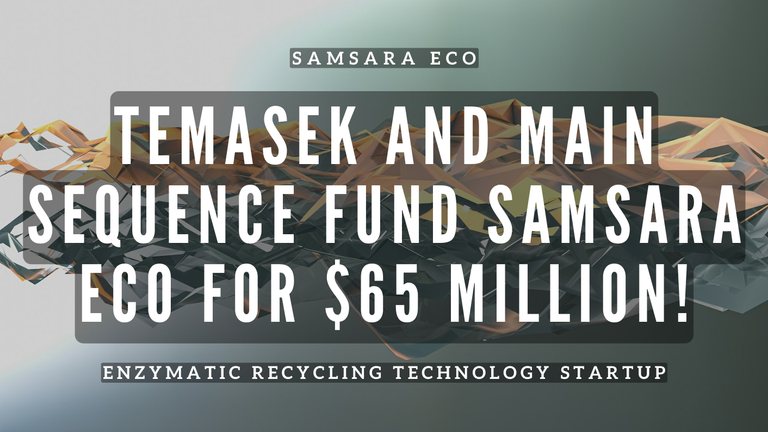Temasek and Main Sequence fund Samsara Eco for $65 Million! | An Enzymatic Recycling Technology startup

Steve Johnson | Unsplash
Undoubtedly, concern for the environment is one of the circumstances that has been taken into account the most in recent times. Consumers are able to show their inclination towards a healthier world and companies are eagerly waiting to see what kind of solution they can offer. Obviously, this creates a market to participate in where environmental technology companies willing to make investments will come.
Samsara Eco is a startup based in Australia that is dedicated to the manufacturing and sale of fossil-free polymeric resins. As a sustainable alternative, it allows for the replacement of traditional plastic packaging and textile products. We commonly have some notion of biodegradable products, and adding this to the mix, it is a great contribution.

Urban Vintage | Unsplash
The company has made a very good impression to the point of securing funding from firms co-led by Temasek and Main Sequence for a value of $65 million dollars. Additionally, sponsors such as DCVC, Hitachi Venture, Lululemon, Titanium Ventures, and Wollemi Capital participated in this funding round. With this in mind, the total amount rises to $73 million dollars.
Paul Riley, CEO and founder of Samsara Eco, has mentioned that polyester has been able to be recycled using enzymes. This achievement was made possible through a partnership with Lululemon, launching the product earlier this year. The process was not simple at all, as it was necessary to recycle nylon 6,6, which is really complex, using polyester and nylon 6.
Nylon 6,6 is a high complexity synthetic polymer used in the textile and plastic industries.
This funding could lead to the expansion of the brand. At least those are some of the plans that the company has in mind. Initially, facilities are being built in New South Wales, specifically in Jerrabombera, and the idea is to offer services to customers worldwide in a search for partnerships. There are also plans to expand facilities in North America.
Another goal with this funding is the construction of facilities in Southeast Asia, which could be a very good idea considering the growing operations by other manufacturing brands there. According to Riley, this action would be very beneficial for expanding global marketing, laying the groundwork for more trade routes.
If there is something very important to mention, it is the significant reduction in carbon emissions. These products comply with circularity and are sustainable over time, so recycling nylon 6,6 and polyester provides a much longer lifespan, preventing them from ending up in landfills and posing a risk to the environment.
From my point of view, these recycling ideas contribute a lot to the environment, considering first the lack of emissions into the atmosphere, but also the degradability that could turn into pollutants. Moreover, considering where many conventional plastics end up, we can get an idea of how problematic the issue is. The place that could worry me the most is that certain products that have reached the end of their life cycle end up in the oceans and affect deep-sea creatures.
Samsara EosEco is a patented recycling technology and differs from traditional methods in that there is a drastic reduction in the temperature and pressure used in the manufacturing or recycling process, significantly reducing recycling time.
In this way, energy, heat, and carbon emissions are minimized to the lowest possible level, which is very good considering other processes involving plastics derived from fossil fuels. Additionally, the company not only focuses on recycling conventional plastics but also looks towards various types of plastics, including colors and polymer blends. In this context, there are plans to expand the library of enzymes to recycle more plastics for the future.
Riley believes that if done right, the technology could allow for the recycling of 1.5 million tons of plastic per year by 2030. This would result in saving millions of tons of carbon emissions that could be released into the environment.

- Main image edited in Canva.
- I have consulted information in techcrunch.com.
- I have used Hive Translator to translate from Spanish to English.
Posted Using InLeo Alpha
Wow. This is really amazing.
Gladly, investors have their eyes on it.
That's really a huge number. 1.5million tons recycled by 2030? It's mind blowing.
Not only environmental friendly, but saves more time..
Thank you for keeping us updated.
It really will be a radical change over time. I hope everything goes as planned and is a benefit for everyone.
I also hope so...
This is revolutionary
Great. Funding eco-friendly technology is a worthy initiative.
It will mark a major change in the industry.
Keep up the good work. 👏
Recognized by Mystic artist Gudasol
You are loved.
Interested to to help music map cXc.world spread more good vibes on Hive?.